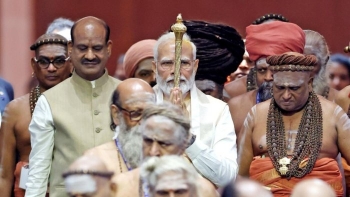
.png) Dr Suresh Mathew
Dr Suresh Mathew

The much-trumpeted inauguration of the new Parliament building is over. It had all the trappings of a new India which Prime Minister Narendra Modi referred to in his speech at the grand function. But his new India seems unlikely to be the one ‘we the people of India’ want to see as promised in the preamble of the Constitution -- a sovereign, socialist, secular, democratic republic. The focus of the day’s proceedings betrayed the fear that has been lurking in the minds of many for several years now.
The Parliament represents 140 crore people, the largest representative house in the world. It represents people of all religions and all categories. But, as the Prime Minister entered the Parliament for its inauguration, he took along with him only the Hindu priests, to the exclusion of all other religions.
In yet another symbolic move, he carried a Sengol (sceptre), which was gifted to Pandit Jawaharlal Nehru by the priests of Thiruvaduthurai Adheenam (Mutt) in Tamil Nadu on the eve India got independence. Sengol represents divine power of kings in ancient India; it changed hands from the incumbent king to the incoming person. But India is not a kingdom ruled by kings, but a democratic country wherein Sengol does not mean anything, unless its holder has any plans to switch from democracy to autocracy. Add to this the rituals and ceremonies conducted on the Parliament premises on the morning of the inaugural day. Hindu ritualism overshadowed all other functions, despite the symbolic all-religion prayers at the venue.
With just about 10 months left for the next general elections, the Prime Minister seems to have fully exploited the occasion to showcase him as the only ruler who can take the country to new heights. He was one of the few present at the havan held on the Parliament premises; he was seen making sashtang pranam (prostration) during the rituals; he was leading the Hindu priests while taking the Sengol to be placed at the Speaker’s chamber; apart from a brief speech by Lok Sabha Speaker, Modi was the only one scheduled to address the gathering; in fact, with the absence of the President and the Vice-President, the whole spotlight was on Modi. He was the one who was always under the arc lights.
Parliament is the epitome of the diversity of people’s representatives. As many as 21 political parties and their Members of Parliament boycotted the function, in protest against the government’s decision to not invite the President, who is the head of the State, to inaugurate the Parliament building. The Vice-President, who is the chairman of the Rajya Sabha, too did not get the invite to one of the most solemn occasions in the history of independent India.
The shadow of absentees was more pronounced than the visuals of those present. This unusual situation, witnessed during the opening of the sanctum sanctorum of Indian democracy, would remain a stain in the history of India. This seems to be the result of the government’s needless enthusiasm to project one leader as if he alone matters in the country. It is the result of scant regard for constitutional values and democratic norms; it is a symptom of electoral democracy nose-diving to electoral autocracy.